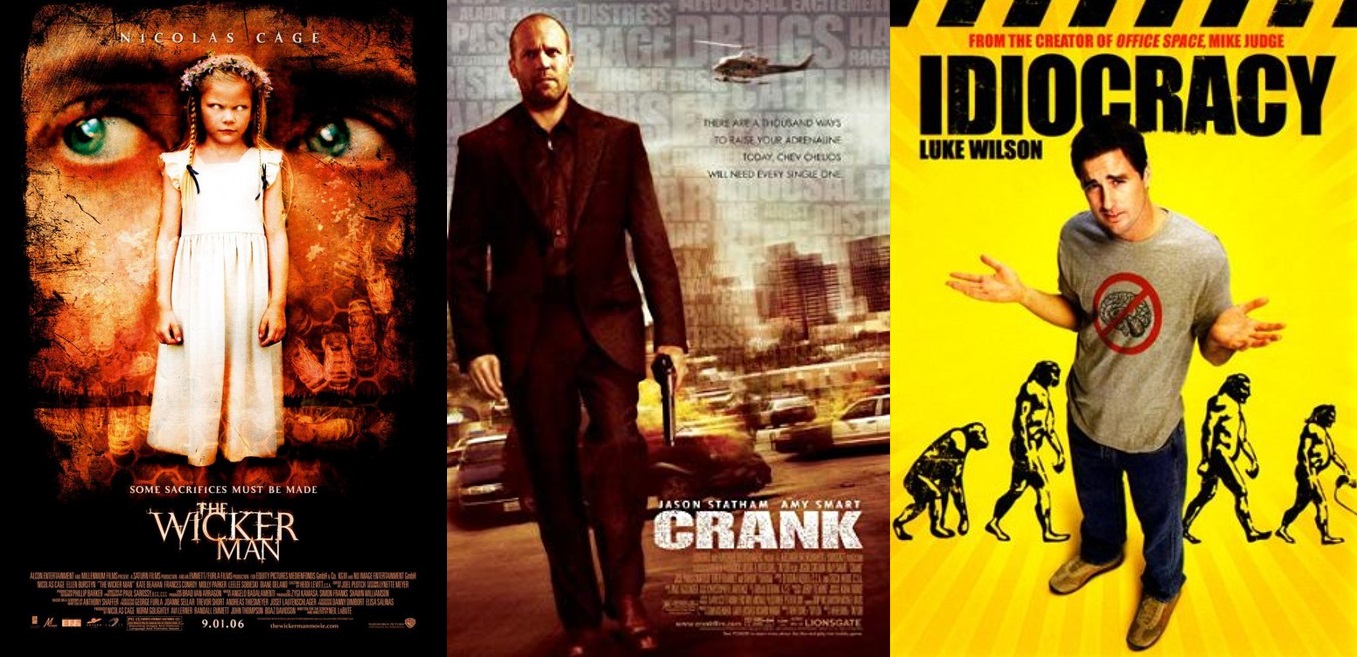Labor Day has always been one of the tentpole weekends for studios to unload some of their least desirable products. One can count on at least one of those titles opening without an advance screening for press. The logic goes that if a studio hides the movie from critics, the public will not get word of it being a stinker. Or at least, that‘s part of the logic. The other side is that it costs money to get those advance screenings up and running, and the studios would rather not throw good money after bad. Best to just put the film out of its misery, cut their losses and collect what money they can on opening weekend.
On Labor Day weekend in 2006, though, a trifecta of seemingly disposable titles opened up without fanfare or press screenings: “Crank”, starring Jason Staham; Neil LaBute’s remake of “The Wicker Man”, starring Nicolas Cage; Mike Judge’s satirical comedy “Idiocracy.” Three films that studios deemed unfit for stuffy old film critics and ones that they hoped would make some of their money back and then disappear without a trace. The funny thing is that these three particular films have managed to live on in some form or another, notably through cult film enthusiasts, cultural historians and fans of “bad cinema.”

“The Wicker Man,” perhaps the most high-profile of the three—since it comes from a major studio, a critically adored director and a name-above-the-title movie star—falls into the third category. That Cage would give an over-the-top performance in anything should surprise no one. The fact that the auteur behind the project is a renowned playwright and award-winning indie director of such provocative films as, “In the Company Of Men” (1997), “Your Friends and Neighbors” (1998) and “The Shape of Things” (2003) caused many film writers to wonder just what Warner Bros. was trying to hide. If anything, LaBute seemed like a good choice to modernize the 1973 version and put his own feminist parable spin on it (of course, today a female director would be most desired, but unfortunately, that conversation rarely took place back then).
It starts out as a fairly routine horror thriller, in which Cage plays a detective investigating the disappearance of a little girl who comes from a remote enclave populated by women who would fit right at home with the townsfolk of Ari Aster’s “Midsommar,” except the men in the town cannot speak and appear to do the women’s bidding. The more Cage’s character investigates, the weirder the place gets.
It’s obvious the final twenty minutes is where the studio had second thoughts about letting the press get an advance viewing. Still, it remains a hoot to watch as Cage disguises himself in a bear costume, eventually gets tortured by the women and made to wear a headpiece filled with live bees, to which he shouts the immortal line, “NOT THE BEES!!!” Cage has become a cartoon version of himself over the years, occasionally trying for and succeeding in being a good actor again (see David Gordon Green’s “Joe” from 2013 for a solid example of this, as well as last year’s “Mandy”). His performance in “The Wicker Man” will live on for all the wrong reasons, although LaBute did re-edit the scene for the DVD release. If you want to view Cage in all his scenery-chewing glory, you have to flip the disc over to the pan-and-scan version to see what everyone else saw in 2006 (and if you want to go further than that, see 1988’s “Vampire’s Kiss” and especially 1993’s “Deadfall”).
LaBute’s “The Wicker Man” has become a bad movie classic of sorts, mostly for the last half hour, but it is worth noting how much better LaBute’s re-edited version plays today. It remains a bit silly overall, but the re-edit—without the sight of Cage going bananas—does work in LaBute’s favor and the film feels more of its time in 2019 as a pulpy horror thriller for the #MeToo era, although the film is listed on IMDb’s Bottom 100.

The reason for “Crank” not being screened for critics is more traditional. Statham, at that point and possibly still today, had never been a critics’ favorite. Here he was in a completely ridiculous storyline (an assassin is injected with poison that will kill him unless he keeps his heart rate up) in which illogical and absurd situations keep popping up, testing the viewers’ ability to suspend disbelief. Edited like a Michael Bay-directed video game and an aspiring editor’s clip reel on speed, “Crank” was the opposite of subtlety and geared toward a younger, less discriminating demographic currently being raised on a steady diet of Red Bull, Grand Theft Auto and testosterone supplements. Lions Gate thought this wasn’t a movie “for critics.”
They were wrong. A movie like “Crank” could be viewed for the outrageous cavalcade of violence and drug-addled stupidity it clearly aspires to be and the younger film critics at the time of its release seemed to be more in tune with that aesthetic. As of now, the film holds a 61% on Rotten Tomatoes. Not bad for a film that today would never see the light of day because of its blatant racism and an uncomfortable-to-watch sex scene that pretty much starts out as a rape. There are moments in “Crank” that, today, make it hard to defend, but love it or hate it, you’ll still never forget it.
“Crank” managed to open at #2 on Labor Day weekend with $10 million and made just enough money during its run to encourage Lions Gate to greenlight an equally absurd sequel that picks up right where the first one left off, itself a jubilant act of pure nonsense. Today, both films still have moments that make you say “I can’t believe there are two of these!”

The situation with Mike Judge’s “Idiocracy” remains wholly unique among the three films. Not only did 20th Century Fox not screen the film for critics, they all but pretended the film did not exist. After disastrous test screenings (presumably made up of the wrong target audience) and Fox’s trepidation over Judge taking comedic shots at such corporate heavyweights as Starbucks, Costco, and Fox News itself, the film was quietly distributed into the bare minimum of screens that the studio could book in order to fulfill its contractual obligation. The film had no trailer and no TV ads. They didn’t even give the film a name on Moviefone when people tried to order tickets (only “Untitled Mike Judge Film” would come up). With only 130 screens nationwide, the film opened at #44 on the box office chart with a dismal $124,000.
The story was a simple enough, high-concept piece about a mid-level military officer of average intelligence (Luke Wilson) who wakes up 500 years in the future to an incredibly dumbed-down America, so much so that he ends up being the smartest person alive. Few people can make stupidity as endearing as Judge, the creative force behind “Beavis and Butthead,” “King of the Hill” and the 1999 cult classic “Office Space,” which Fox also produced and mishandled. Today, “Idiocracy” remains a prophetic wonder, with some of Judge’s predictions being off by about 490 years or so. The President of the United States in Judge’s film is a former porn star and Smackdown champion named Dwayne Elizondo Mountain Dew Herbert Camacho (brilliantly played by Terry Crews) whose cabinet is made up of unqualified dimwits who think electrolytes in Gatorade will help plants grow. In 2019, the film plays like a documentary.
Still, satirical jabs such as that don’t play well in certain pockets of the country, which is why they have a saying in show business that “satire closes on Friday night.” Yet, I somehow managed to see the film twice during its run, the second time being the following weekend here in Chicago where the Regal City North managed to hang onto the film a little longer because they clearly found an audience for it. That second time seeing it, on a Saturday night at 10:30pm, was probably the biggest attendance the film ever had during its release. The place was filled and everyone got the jokes. Somehow, word got out that this film existed and was worth seeing. Unfortunately, the enthusiasm did not spread fast enough to make any impact or give Fox a change of heart, but the film eventually found its audience upon its DVD release (still not on Blu-ray and I wouldn’t expect Disney to correct that).
Of the three films, “Idiocracy” is the only one to have endured as a quality film, albeit with hit-or-miss gags that, to me anyway, mostly hit. Today, the film’s title doubles as a term used in news cycles as a kind of shortcut to describe the world in which we live. When Pixar’s beloved classic “WALL-E” came out in 2008, some critics pointed to “Idiocracy” as a kind of unconscious influence on the film’s vision of a dumbed-down, consumer-driven future.

“The Wicker Man” has become a “bad movie” classic that has been riffed on the Mystery Science Theater 3000 offshoot “Rifftrax” and hilariously dissected on the hit podcast “How Did This Get Made?” “Not the bees!” is almost as ubiquitous as a movie quote as “Oh, hi Mark” from “The Room,” at least among cult film and “bad movie” enthusiasts. LaBute has tried to eliminate the existence of that moment, but it’s too late. Watch the scene on YouTube and you’ll see what I mean.
“Crank” has not aged well in the woke, #MeToo era of 2019. Even in 2006, the creators Mark Neveldine and Brian Taylor, clearly wanted to offend everyone, which they certainly accomplished. Yet it remains quite a ride and its arrival at the tail end of summer felt like a smackdown of the season’s action thrillers that preceded it: “Mission: Impossible III,” “The Fast and the Furious: Tokyo Drift,” “Miami Vice” and even “Snakes On A Plane,” a film also not screened for critics, but one that uniquely became a cult sensation prior to release, then disappeared from the conversation after the Thursday midnight showing.
The #1 film at the box office on Labor Day weekend was a sports drama called “Invincible,” starring Mark Wahlberg, which enjoyed its second weekend at the top. To this day, I cannot remember if I actually saw this film. If I did, it had zero impact on me. I do remember my colleague Erik Childress and I going to Streets of Woodfield theater in Schaumburg, Illinois to see all three of these films that weekend and us having a blast.
So, none of these films were screened for critics for various reasons, yet here I am on a respected film critic’s website writing about them 13 years later. It all reminds me of a quote from Scott Weinberg in the film “Best Worst Movie”: “Bad food is bad. Bad books are bad. But bad movies are not always bad.”
Special thanks to Erik Childress.












